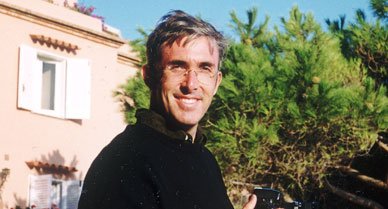The need for perpetual motion has always been Tony Perrottet’s most obvious personality disorder. Born in Sydney, Australia, he traveled around Asia and South America before settling a foreign correspondent in Buenos Aires. From his current base in the East Village of Manhattan, he has continued to commute to Iceland, Zanzibar and Tierra del Fuego, contributing to publications including Esquire, Outside, Islands, the New York Times and London Sunday Times. His book Route 66 A.D.: On the Trail of Ancient Roman Tourists, was released in 2002; the paperback edition, to be published this month, will be titled Pagan Holiday.
How did you get started traveling?
I’m Australian, and they say we’re born with a passport in our hands. I had lived for two years in London, covered most of Europe and spent a year in California before the time I turned five. When my family moved back to Sydney, we took long trips — most memorably, to Tahiti when I was sixteen, where the vision of gorgeous French women with a laissez-faire attitude to bikini tops impressed me that the world was a pretty intriguing place beyond suburban Sydney. At college, I used to hitch-hike around the Outback during month-long breaks, and it was easy to save enough for trips to Asia … so travel was pretty well in my blood.
How did you get started writing?
I was always writing as a kid — comic books, adventure stories, science fiction. My uncle ran a bookstore and used to write stories for Sydney newspapers, and he was the one who explained that the authors weren’t always on staff, they often used freelance articles. The idea that I could make money out of writing was an eye-opener.
What do you consider your first “break” as a travel writer?
I went to India for three months when I was 21, and took a camel safari through the deserts of Rajasthan. It was pretty vivid, so I put together a 1000 word piece and sent it in on spec to an Australian weekly newspaper. One day, I opened the paper up, and there it was! But my real ‘break’ came a couple of years later, when I turned my history thesis into a story and the same newspaper ran it as a cover story… I’d just landed in Argentina with a one-way ticket, planning to travel around South America, so I contacted the foreign editor and started writing all sorts of pieces as their “roving correspondent.”
As a traveler and fact/story-gatherer, what is your biggest challenge on the road?
Becoming a participant in things rather than just an observer. I have to be slightly more pushy and extroverted than I might normally be (which I actually enjoy).
What is your biggest challenge in the writing process?
Finishing. I don’t seem to have much trouble starting to write — but knowing when to stop tinkering with a story, is hard. Without deadlines, I might fiddle with pieces forever.
What is your biggest challenge from a business standpoint?
Getting a trip organized can be very time-consuming, if you want someone else to pay for it! Often it’s easier just to go where you want and write the stories that crop up. Writing magazine query letters about places I haven’t yet been to is quite strange — I don’t really know what’s going to happen on the trip — so it’s better if you have a good relationship with an editor and can just toss around ideas verbally. Also, the magazine fact-checking process I find rather exhausting, especially since it’s often months, even a year, since I’ve taken a trip. I’ve often finished with a story in my head by then…
Do you do other work to make ends meet?
I think I’m pretty unemployable at anything but writing — although I’ve always had a convenient sideline in photography. When I lived in South America, I used to have to take photos to go with my newspaper stories (often I was going to remote places, covering gold rushes in the Bolivian Amazon etc), so I became handy with a camera. I still take a lot of transparencies, which brings in some extra cash when magazines need images. I find photography fairly easy and stress-free — my ego isn’t involved in it!
What travel authors or books might you recommend and/or have influenced you?
I read Jack Kerouac at an impressionable age, which inspired me to head off on many slightly deranged hitch-hiking trips around Australia. Bruce Chatwin’s In Patagonia showed me how history could be used as the basis for a travel narrative. I love to read old travel books about places I visit — Mark Twain’s The Innocents Abroad in Europe, Isabella Bird in Hawaii, old safari stories in Africa, Robert Louis Stevenson in Samoa. Then there’s Graham Greene, Henry Miller, P.J. O’Rourke, David Sedaris …
What advice or warnings would you give to someone who is considering going into travel writing?
This may sound specious, but start traveling and writing — nobody’s going to send you anywhere until you have quite a few stories under your belt already. Send in stories on spec. And it helps if you move to a Third World hellhole — it’s cheap! Surviving on your writing is a lot easier in Bogota, say, than Manhattan, and provides a lot more unique material when you’re starting out…
What is the biggest reward of life as a travel writer?
The freedom — and the unpredictability of it. It’s great to get a call from an editor who says: “How would you like to go to Zanzibar?” I’m also not a big fan of the New York winter, so being able to pack up at a moment’s notice and head south for three months in January is crucial for my mental well-being…

